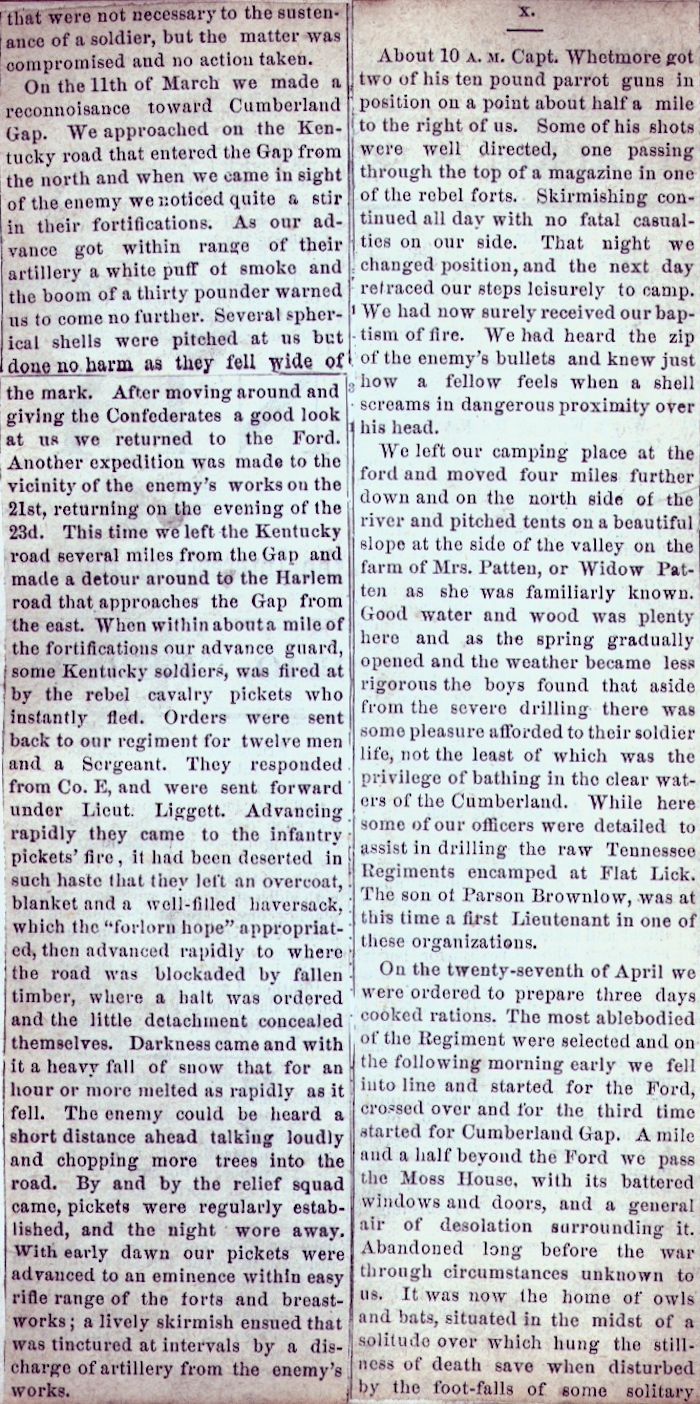| Camp & Field Page 15 | Camp & Field Index Page | 16th OVI Home Page | Camp & Field Page 17 |
The Camp & FieldArticles by Theodore Wolbach |
 Cpl. Theodore D. Wolbach |
The following image is taken from a book titled "Mortality and Statistics of the Census of 1850" in which it is believed retired Captain Rezin H. Vorhes, Company H, pasted over the pages a series of articles written by Cpl. Theodore D. Wolbach, Company E, titled "Camp and Field" and published, by chapter, in the Holmes County (Ohio) Republican newspaper from February 24, 1881 to August 17, 1882. The articles tell the story, in great detail and color, of the 16th OVI, from the inception of the 3-year regiment in October, 1861, through all its camps, battles and marches until it was disbanded on October 31, 1864. The articles pasted in the Vorhes book cover the first 35 chapters, published through October 20, 1881. All the remaining chapters were recently found in a Holmes County library by researcher Rob Garber who obtained copies, performed the transcriptions and provided to this website and which are also presented here, thus providing the complete work by Theodore Wolbach.
Throughout these articles click on the underlined white text for additional details.
The webauthor thanks 16th Ohio descendant Rob Garber for his excellent research on the Camp And Field articles and for performing the tedious digital transcription of those articles found on each page. The transcriptions were made to reflect the original articles verbatim, misspellings and all. Rob is the 3rd great nephew of Capt. William Buchanan, Company F, 16th Ohio, who served in the 90-day regiment as a private, re-enlisting in the three year regiment, and eventually making the rank of Captain of Company F. Thanks Rob!
Page 16 - Chapter 9, 10 - March/April, 1862
 |
that were not necessary to the sustenance of a soldier, but the matter was compromised and no action taken. On the 11th of March we made a reconnoisance [sic] toward Cumberland Gap. We approached on the Kentucky road that entered the Gap from the north and when we came in sight of the enemy we noticed quite a stir in their fortifications. As our advance got within range of their artillery a white puff of smoke and the boom of a thirty pounder warned us to come no further. Several spherical shells were pitched at us but done no harm as they fell wide of the mark. After moving around and giving the Confederates a good look at us we returned to the Ford. Another expedition was made to the vicinity of the enemy's works on the 21st, returning on the evening of the 23d. This time we left the Kentucky road several miles from the Gap and made a detour around to the Harlem [Harlan] road that approaches the Gap from the east. When within about a mile of the fortifications our advance guard, some Kentucky soldiers, was fired at by the rebel cavalry pickets who instantly fled. Orders were sent back t our regiment for twelve men and a Sergeant. They responded from Co. E, and were sent forward under Lieut. Liggett. Advancing rapidly they came to the infantry pickets' fire, it had been deserted in such haste that they left an overcoat, blanket and a well-filled haversack, which the |
Published in Holmes County Republican X. About 10 A.M. Capt. Whetmore got two of his ten pound parrot guns in position on a point about half a mile to the right of us. Some of his shots were well directed, one passing through the top of a magazine in one of the rebel forts. Skirmishing continued all day with no fatal casualties on our side. That next night we changed position, and the next day retraced our steps leisurely to camp. We had now surely received our baptism of fire. We had heard the zip of the enemy's bullets and knew just how a fellow feels when a shell screams in dangerous proximity over his head. We left our camping place at the ford and moved four miles further down and on the north side of the river and pitched tents on a beautiful slope at the side of the valley on the farm of Mrs. Patten, or Widow Patten as she was familiarly known. Good water and wood was plenty here and as the spring gradually opened and the weather became less rigorous the boys found that aside from the severe drilling there was some pleasure afforded to their soldier life, not the least of which was the privilege of bathing in the clear waters of the Cumberland. While here some of our soldiers were detailed to assist in drilling the raw Tennessee Regiments encamped at Flat Lick. The son of Parson Brownlow, was at this time a first Lieutenant in one of these organizations. On the twenty-seventh of April we were ordered to prepare three days cooked rations. The most ablebodied of the Regiment were selected and on the following morning early we fell into line and started for the Ford, crossed over and for the third time started for Cumberland Gap. A mile and a half beyond the Ford we pass the Moss House, with its battered windows and doors, and a general air of desolation surrounding it. Abandoned long before the war through circumstances unknown to us. It was now the home of owls and bats, situated in the midst of a solitude over which hung the stillness of death save when disturbed by the foot-falls of some solitary |
| Camp & Field Page 15 | Camp & Field Index Page | 16th OVI Home Page | Camp & Field Page 17 |